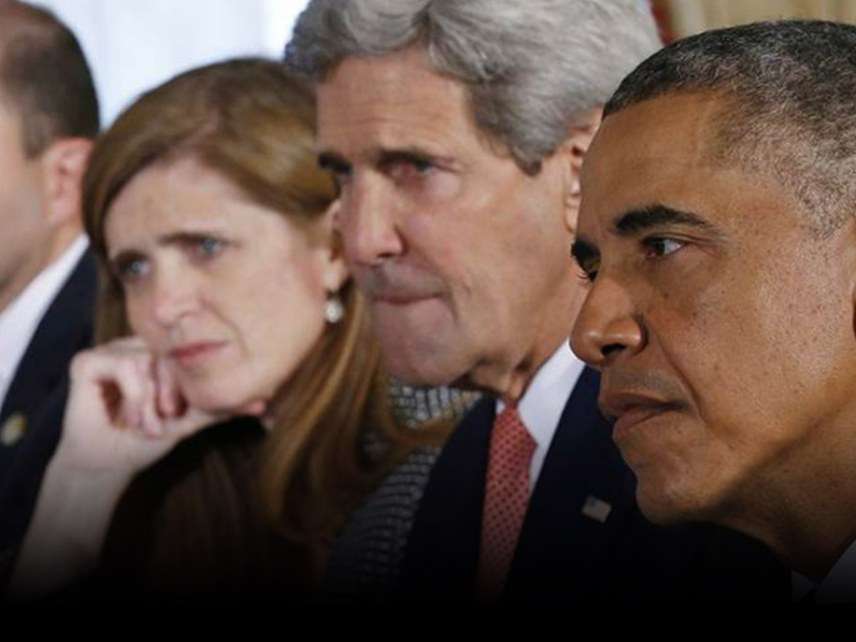HBO's Dishonest Obama Documentary Is Fantasy Foreign Policy Puffery
Lots of administration official log-rolling in The Final Year, but little actual analysis
The Final Year. HBO. Monday, May 21, 8 p.m.

It is a risky business picking the single most aggravatingly stupid scene in The Final Year, an HBO documentary on Obama administration foreign policy that's suffused in puffery and obfuscation, but let's give it a try.
My choice is the segment on the president's 2016 visit to Laos, the target of something on the order of two million tons of American bombs during the Vietnam War. The point of the visit, explains Obama foreign-policy aide Ben Rhodes in an interview in the documentary, is to demonstrate that those days are over.
"In Washington, there is a kind of default that we've been trying to break," explains the preening Rhodes. "Which is that the way in which we demonstrate that we're serious about a problem is by using military force."
So how did President Obama demonstrate that new American disdain for military force? By announcing his deployments of a Marine strike force to Australia and a missile-defense system to South Korea, and promising that the United States would more frequently butt into disputes between China and its neighbors. Pacifism unchained!
But you'll have to read about that part in The New York Times, because it didn't make it into The Final Year. And though there's plenty of footage of Obama courageously denouncing U.S. bombing raids in Laos by another president more than 40 years ago, his own murderous use of drones in the Middle East—at a rate 10 times as high as that of the foreign-policy cowboy George Bush—goes unremarked, by either Obama or the documentary
This sort of profoundly dishonest manipulation of the facts goes on constantly in The Final Year, ostensibly a report of the conduct of U.S. foreign policy during the final year of the Obama White House.
In reality, it's less a documentary than a wet goodbye kiss to Obama, as well as a personal PR document for a few key members of his foreign-policy brain trust, employing that term loosely.
Those include Rhodes, U.N. Ambassador Samantha Power, and to a somewhat lesser extent, Secretary of State John Kerry, all of whom take turns boasting of their foreign-policy acuity and moral superiority. They see no contradiction between their imperious self-regard and Power's admission, as Obama leaves office, that "My world is a world where you have 65 million displaced people … and all the trend lines on democracy—right now, at least—are going in the wrong direction."
How that could have possibly happened with such a brave and astute team of overseers micromanaging the world from Washington is not addressed in The Final Year.
In part, that's because with all the reputational log-rolling going on, there's little time—virtually none, in fact—for the actual nuts and bolts of foreign policy.
The Obama team repeatedly boasts that its three signature achievements are the Paris climate accord, the rapprochement with Cuba, and the Iran nuclear deal. But of how these agreements were reached, or who opposed them and why, there's not a word.
And even less is there an explanation of why, if they were so important, the Obama administration let them stand on a foundation of executive orders, rather than seeking congressional approval to make them law.
The consequence of that decision is that barely a year after he left office, practically nothing is left of what Obama policy-makers regarded as their most important works. President Trump has ditched the Paris and Iran agreements, and the new relationship with Cuba is more like minimalist performance art than diplomacy: Only 10 people, most of them probably spies, are left in the U.S. embassy in Havana after accusations that Cuba has staged, or at least abetted, sonic attacks on American and Canadian diplomats. (Not that this is likely to dismay Rhodes, who declares the Cuba agreement a success because he can "just look at the American and Cuban flags, and be overcome with emotion." Never mind the political prisoners, intelligence moles, and such.
Omission sometimes seems to be the rule rather than the exception in The Final Year. Though scarcely a minute goes by in the documentary without hearing from either Rhodes or Power, there's no mention of the fact that they were often were on opposite sides of administration policy tug-of-wars. (Power is famously a believer in applying that military force that Rhodes so disdains, at least against abusers of ethnic groups, and was one of the key advocates of arming anti-Khadhafi forces in Iraq.)
Nor is there a hint of the wildly entertaining inter-administration soap opera in which Power was one of the stars. An early Obama supporter, she was kicked off his campaign in the 2008 primaries after calling his principal opponent, Hillary somebody-or-other, "a monster." Fortunately, Hillary was a good sport about it and only banned Power from the State Department for four years, coincidentally the exact amount of time Clinton served as secretary of state.
But it's understandable that the Obama guys would forget a thing or two, because they were soooooo busy. Like, the busiest foreign policy geniuses ever, says John Kerry: "We have about as full an agenda as any administration has ever had." And no whining about fighting a three-front world war while dying of cancer and polio, FDR. Buy your own documentary.


Show Comments (38)